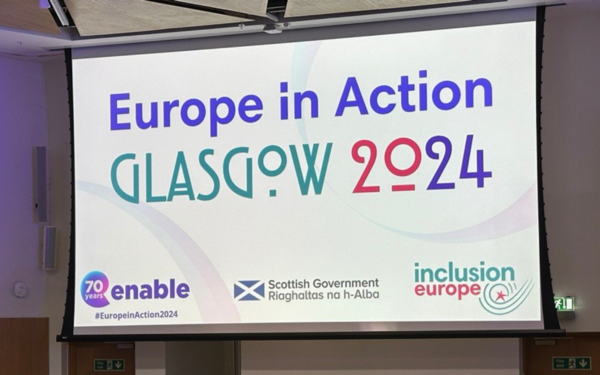Europe in Action Conference unites 400 participants in Glasgow to champion the rights of persons with intellectual disabilities

Between 7-9 May Inclusion Europe, alongside Enable, hosted the 2024 edition of the Europe in Action conference in Glasgow, Scotland. Attended by over 400 people from over 30 countries, the conference shared practices which have successfully promoted inclusion; identified how disability support services can become more aligned with the principles of the UN CRPD and promoted the self-advocacy and activism of persons with intellectual disabilities.
Over the three days participants, who included self-advocates, representatives of Disabled Persons Organisations, support service providers and policymakers, discussed the next steps to advocate for the full rights and inclusion of people with intellectual disabilities and their families. The event also provided a moment to celebrate the 70th Anniversary of Enable and their work to advance the rights of persons with intellectual disabilities in Scotland.
“It’s not perfect, but it’s my home and it lets me live the life I want to lead”
A key theme of the conference was deinstitutionalisation and the continued transition towards community-based and person-centred forms of support. Self-advocates shared their experiences of living within institutions or hospitals and moving into their own homes to live independently.
With Inclusion Europe’s 2023 Inclusion Indicators estimating that over 750,000 persons with intellectual disabilities still live in institutional ‘care’ settings in Europe further action is needed by policymakers, local authorities and support and social care providers to work with people and their families to ensure that the process of deinstitutionalisation continues.
The conference highlighted the importance of person-centred support and planning as well as the need to give persons with intellectual disabilities real choices in where they can live. The Personal Assistant (PA) Model, developed by Enable in Scotland was presented as one example of self-directed support which enables people to personally build their own support team around their personal needs and ambitions. A second practice shared was the work of Plena Inclusion, alongside the Spanish Government and with the support of EU Funds, to transform services into community-based support that promotes inclusion in local communities.
Ensuring that social care and support staff have access to the appropriate training to deliver these person-centred and community-based services was identified as a crucial factor to successfully implement this transition. Participants also identified the need for cross-sectoral collaboration, particularly between those working in housing, employment, education and support to ensure persons with disabilities can be truly included in the community.
“If you see my art in a gallery, you see my ability and I’m not disabled anymore”
Access to quality education in mainstream settings is essential to empower persons with intellectual disabilities to actively participate in and contribute to their communities.
The negative impacts of bullying were identified as an obstacle to the achievement of inclusive education, as was the need for better teacher training that equips education professionals with the right tools and knowledge to meet the different learning needs of their students.
Self-advocates also called on teachers to focus on the abilities and diverse talents of their students, rather than on what they can’t do.
“When I was younger, nobody asked me what I wanted to be when I grew up”
Several of the conference’s workshops addressed how to increase employment opportunities for persons with intellectual disabilities. Workshop speakers provided practical tips to employers on how to increase the accessibility and diversity of their organisations.
Enable also presented their Breaking Barriers programme, developed in cooperation with Edinburgh Napier University and ScottishPower to open access to university education and further job opportunities.
Monitoring in Action
Day Two’s panel session focused on the role of data and monitoring in advancing human rights. Inclusion Europe presented their latest Inclusion Indicators which has aimed to close the data gap around the rights and inclusion of people with intellectual disabilities and their families.
In 2023 Inclusion Europe collected data from 29 European countries, including 23 members of the European Union. Key findings of the report include:
- In 26 countries a person’s legal capacity can be removed, and they cannot decide about their own money, or where to live, or who to marry.
- 700,000 learners with intellectual disabilities are still in special schools, deprived of the positive effects of inclusive schooling.
- 20,000 children with intellectual disabilities are getting no education at all.
- Less than 10% of people with intellectual disabilities have a paid job. (Employment rate for people with disabilities in general is 50%, and 75% for people without disabilities.)
To find out more about the Inclusion Indicators, read Inclusion Europe’s full report here.
“Our voices, our choices”
The conference took place just one month before the European Elections. Katarina Ivanković Knežević, Director for Social Rights and Inclusion in the Directorate General for Employment, Social Affairs and Inclusion of the European Commission joined Soufiane El Amrani, Inclusion Europe’s easy-to-read and advocacy expert to speak about the steps been taken to make the European Elections more accessible for persons with disabilities. These steps included the provision of election materials in easy-to-read.
Inclusion Europe’s research has found that only 15 of the 27 EU member states grant full voting rights to people with intellectual disabilities under guardianship. This violation of their rights continues despite a European Parliament resolution asserting that people with disabilities, regardless of their legal capacity restrictions, should be allowed the right to vote. Against this backdrop Laszlo Bercse, Inclusion Europe Vice-President, closed the conference by calling on those who could, to use their vote to support those who will work for persons with intellectual disabilities.
To find out more about the Europe in Action 2024 conference, click here.

